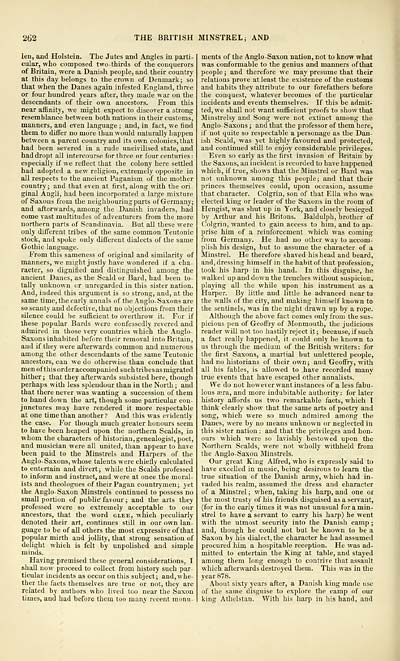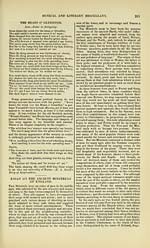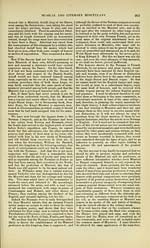Glen Collection of printed music > Printed music > British minstrel, and musical and literary miscellany
(270) Page 262
Download files
Complete book:
Individual page:
Thumbnail gallery: Grid view | List view

262
THE BRITISH MINSTREL; AND
len, and Holstein. The Jutes and Angles in parti-
cular, who composed two-thirds of the conquerors
of Britain, were a Danish people, and their country
at this day belongs to the crown of Denmark; so
that when the Danes again infested England, three
or four hundred years after, they made war on the
descendants of their own ancestors. From this
near affinity, we might expect to discover a strong
resemblance between both nations in their customs,
manners, and even language ; and, in fact, we find
them to differ no more than would naturally happen
between a parent country and its own colonies, that
had been severed in a rude uncivilised state, and
had dropt all intercourse for three or four centuries :
especially if we reflect that the colony here settled
had adopted a new religion, extremely opposite in
all respects to the ancient Paganism of the mother
country; and that even at first, along with the ori-
ginal Angli, had been incorporated a large mixture
of Saxons from the neighbouring parts of Germany;
and afterwards, among the Danish invaders, had
come vast multitudes of adventurers from the more
northern parts of Scandinavia. But all these were
only different tribes of the same common Teutonic
stock, and spoke only difl'erent dialects of the same
Gothic language.
From this sameness of original and similarity of
tuanners, we might justly have wondered if a cha-
racter, so dignified and distinguished among the
ancient Danes, as the Scald or Bard, had been to-
tally unknown or unregarded in this sister nation.
And, indeed this argument is so strong, and, at the
same time, the early annals of the Anglo-Saxons are
so scanty and defective, that no objections from their
silence could be sufficient to overthrow it. For if
Ihese popular Bards were confessedly revered and
admired in those very countries which the Anglo-
Saxons inhabited before their removal into Britain,
and if they were afterwards common and numerous
among the other descendants of the same Teutonic
ancestors, can we do otherwise than conclude that
men of this order accompanied such tribes as migrated
hither; that they afterwards subsisted here, though
perhaps with less splendour than in the North ; and
that there never was wanting a succession of them
to hand down the art, though some particular con-
junctures may have rendered it more respectable
at one time than another? And this was evidently
the case. For though much greater honours seem
to have been heaped upon the northern Scalds, in
whom the characters of historian, genealogist, poet,
and musician were all united, than appear to have
been paid to the Minstrels and Harpers of the
Anglo-Saxons, whose talents were chiefly calculated
to entertain and divert; while the Scalds professed
to inform and instruct, and were at once the moral-
ists and theologues of their Pagan countrymen; yet
the Anglo-Saxon Minstrels continued to possess no
small portion of public favour ; and the arts they
professed were so extremely acceptable to our
ancestors, that the word glee, which peculiarly
denoted their art, continues still in our own lan-
guage to be of all others the most expressive of that
popular mirth and jollity, that strong sensation of
delight which is felt by unpolished and simple
minds.
Having premised these general considerations, I
shall now proceed to collect from history such par-
ticular incidents as occur on this subject; and, whe-
ther the facts themselves are true or not, they are
related by authors who lived too near the Saxon
times, and had before them too manv recent monu-
ments of the Anglo-Saxon nation, not to know what
was conformable to the genius and manners of that
people ; and therefore we may presume that their
relations prove at least the existence of the customs
and habits they attribute to our forefathers before
the conquest, whatever becomes of the particular
incidents and events themselves. If this be admit-
ted, we shall not want sufficient proofs to show that
Minstrelsy and Song were not extinct among the
Anglo- Saxons ; and that the professor of them here,
if not quite so respectable a personage as the Dan-
ish Scald, was yet highly favoured and protected,
and continued still to enjoy considerable privileges.
Even so early as the first invasion of Britain by
the Saxons, an incident is recorded to have happened
which, if true, shows that the Minstrel or Bard was
not unknown among this people; and that their
princes themselves could, upon occasion, assume
that character. Colgrin, son of that Ella who was
elected king or leader of the Saxons in the room of
Hengist, was shut up in York, and closely besieged
by Arthur and his Britons. Baldulph, brother of
Colgrin, wanted to gain access to him, and to ap-
prise him of a reinforcement which was coming
from Germany. He had no other way to accom-
plish his design, but to assume the character of a
Minstrel. He therefore shaved his head and beard,
and, dressing himself in the habit of that profession,
took his harp in his hand. In this disguise, he
walked up and down the trenches without suspicion,
playing all the while upon his instrument as a
Harper. By little and little he advanced near to
the walls of the city, and making himself known to
the sentinels, was in the night drawn up by a rope.
Although the above fact comes only from the sus-
picious pen of Geofl'ry of Monmouth, the judicious
reader will not too hastily reject it; because, if such
a fact really happened, it could only be known to
us through the medium of the British writers: for
the first Saxons, a martial but unlettered people,
had no historians of their own; and GeofFry, with
all his fables, is allowed to have recorded many
true events that have escaped other annalists.
We do not however want instances of a less fabu-
lous sera, and more indubitable authority : for later
history affords us two remarkable facts, which I
think clearly show that the same arts of poetry and
song, which were so much admired among the
Danes, were by no means unknown or neglected in
this sister nation : and that the privileges and hon-
ours which were so lavishly bestowed upon the
Northern Scalds, were not wholly withheld from
the Anglo-Saxon Minstrels.
Our great King Alfred, who is expressly said to
have excelled in music, being desirous to learn the
true situation of the Danish army, which had in-
vaded his realm, assumed tlie dress and character
of a Minstrel ; when, taking his harp, and one ox
the most trusty of his friends disguised as a servant,
(for in the early times it was not unusual for a min-
strel to have a servant to carry his harp) he went
with the utmost security into the Danish camp ;
and, though he could not but be known to be a
Saxon by his dialect, the character he had assumed
procured him a hospitable reception. He was ad-
mitted to entertain the King at table, and stayed
among them long enough to contrive that assault
which afterwards destroyed them. This was in the
year 878.
About sixty years after, a Danish king made use
of the same disguise to explore the camp of our
king Athelstan. With his harp in his hand, and
THE BRITISH MINSTREL; AND
len, and Holstein. The Jutes and Angles in parti-
cular, who composed two-thirds of the conquerors
of Britain, were a Danish people, and their country
at this day belongs to the crown of Denmark; so
that when the Danes again infested England, three
or four hundred years after, they made war on the
descendants of their own ancestors. From this
near affinity, we might expect to discover a strong
resemblance between both nations in their customs,
manners, and even language ; and, in fact, we find
them to differ no more than would naturally happen
between a parent country and its own colonies, that
had been severed in a rude uncivilised state, and
had dropt all intercourse for three or four centuries :
especially if we reflect that the colony here settled
had adopted a new religion, extremely opposite in
all respects to the ancient Paganism of the mother
country; and that even at first, along with the ori-
ginal Angli, had been incorporated a large mixture
of Saxons from the neighbouring parts of Germany;
and afterwards, among the Danish invaders, had
come vast multitudes of adventurers from the more
northern parts of Scandinavia. But all these were
only different tribes of the same common Teutonic
stock, and spoke only difl'erent dialects of the same
Gothic language.
From this sameness of original and similarity of
tuanners, we might justly have wondered if a cha-
racter, so dignified and distinguished among the
ancient Danes, as the Scald or Bard, had been to-
tally unknown or unregarded in this sister nation.
And, indeed this argument is so strong, and, at the
same time, the early annals of the Anglo-Saxons are
so scanty and defective, that no objections from their
silence could be sufficient to overthrow it. For if
Ihese popular Bards were confessedly revered and
admired in those very countries which the Anglo-
Saxons inhabited before their removal into Britain,
and if they were afterwards common and numerous
among the other descendants of the same Teutonic
ancestors, can we do otherwise than conclude that
men of this order accompanied such tribes as migrated
hither; that they afterwards subsisted here, though
perhaps with less splendour than in the North ; and
that there never was wanting a succession of them
to hand down the art, though some particular con-
junctures may have rendered it more respectable
at one time than another? And this was evidently
the case. For though much greater honours seem
to have been heaped upon the northern Scalds, in
whom the characters of historian, genealogist, poet,
and musician were all united, than appear to have
been paid to the Minstrels and Harpers of the
Anglo-Saxons, whose talents were chiefly calculated
to entertain and divert; while the Scalds professed
to inform and instruct, and were at once the moral-
ists and theologues of their Pagan countrymen; yet
the Anglo-Saxon Minstrels continued to possess no
small portion of public favour ; and the arts they
professed were so extremely acceptable to our
ancestors, that the word glee, which peculiarly
denoted their art, continues still in our own lan-
guage to be of all others the most expressive of that
popular mirth and jollity, that strong sensation of
delight which is felt by unpolished and simple
minds.
Having premised these general considerations, I
shall now proceed to collect from history such par-
ticular incidents as occur on this subject; and, whe-
ther the facts themselves are true or not, they are
related by authors who lived too near the Saxon
times, and had before them too manv recent monu-
ments of the Anglo-Saxon nation, not to know what
was conformable to the genius and manners of that
people ; and therefore we may presume that their
relations prove at least the existence of the customs
and habits they attribute to our forefathers before
the conquest, whatever becomes of the particular
incidents and events themselves. If this be admit-
ted, we shall not want sufficient proofs to show that
Minstrelsy and Song were not extinct among the
Anglo- Saxons ; and that the professor of them here,
if not quite so respectable a personage as the Dan-
ish Scald, was yet highly favoured and protected,
and continued still to enjoy considerable privileges.
Even so early as the first invasion of Britain by
the Saxons, an incident is recorded to have happened
which, if true, shows that the Minstrel or Bard was
not unknown among this people; and that their
princes themselves could, upon occasion, assume
that character. Colgrin, son of that Ella who was
elected king or leader of the Saxons in the room of
Hengist, was shut up in York, and closely besieged
by Arthur and his Britons. Baldulph, brother of
Colgrin, wanted to gain access to him, and to ap-
prise him of a reinforcement which was coming
from Germany. He had no other way to accom-
plish his design, but to assume the character of a
Minstrel. He therefore shaved his head and beard,
and, dressing himself in the habit of that profession,
took his harp in his hand. In this disguise, he
walked up and down the trenches without suspicion,
playing all the while upon his instrument as a
Harper. By little and little he advanced near to
the walls of the city, and making himself known to
the sentinels, was in the night drawn up by a rope.
Although the above fact comes only from the sus-
picious pen of Geofl'ry of Monmouth, the judicious
reader will not too hastily reject it; because, if such
a fact really happened, it could only be known to
us through the medium of the British writers: for
the first Saxons, a martial but unlettered people,
had no historians of their own; and GeofFry, with
all his fables, is allowed to have recorded many
true events that have escaped other annalists.
We do not however want instances of a less fabu-
lous sera, and more indubitable authority : for later
history affords us two remarkable facts, which I
think clearly show that the same arts of poetry and
song, which were so much admired among the
Danes, were by no means unknown or neglected in
this sister nation : and that the privileges and hon-
ours which were so lavishly bestowed upon the
Northern Scalds, were not wholly withheld from
the Anglo-Saxon Minstrels.
Our great King Alfred, who is expressly said to
have excelled in music, being desirous to learn the
true situation of the Danish army, which had in-
vaded his realm, assumed tlie dress and character
of a Minstrel ; when, taking his harp, and one ox
the most trusty of his friends disguised as a servant,
(for in the early times it was not unusual for a min-
strel to have a servant to carry his harp) he went
with the utmost security into the Danish camp ;
and, though he could not but be known to be a
Saxon by his dialect, the character he had assumed
procured him a hospitable reception. He was ad-
mitted to entertain the King at table, and stayed
among them long enough to contrive that assault
which afterwards destroyed them. This was in the
year 878.
About sixty years after, a Danish king made use
of the same disguise to explore the camp of our
king Athelstan. With his harp in his hand, and
Set display mode to: Large image | Transcription
Images and transcriptions on this page, including medium image downloads, may be used under the Creative Commons Attribution 4.0 International Licence unless otherwise stated. ![]()
| Special collections of printed music > Glen Collection of printed music > Printed music > British minstrel, and musical and literary miscellany > (270) Page 262 |
|---|
| Permanent URL | https://digital.nls.uk/91438185 |
|---|
| Description | Scottish songs and music of the 18th and early 19th centuries, including music for the Highland bagpipe. These are selected items from the collection of John Glen (1833 to 1904). Also includes a few manuscripts, some treatises, and other books on the subject. |
|---|
| Description | The Glen Collection and the Inglis Collection represent mainly 18th and 19th century Scottish music, including Scottish songs. The collections of Berlioz and Verdi collected by bibliographer Cecil Hopkinson contain contemporary and later editions of the works of the two composers Berlioz and Verdi. |
|---|

